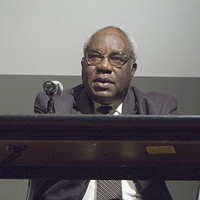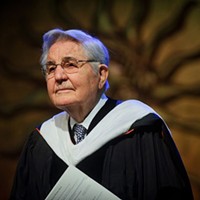How would Amendment One affect your life?
Every North Carolinian — gay, straight, conservative, liberal — should be worried
By Ed WilliamsRecent polls show that the people of North Carolina favor allowing same-sex unions. Yet the numbers also indicate that on May 8, voters are likely to approve a state constitutional amendment that would prohibit such unions.
What, exactly, is Amendment One? What would it do? Why is it coming before North Carolina voters now? And why, despite public opinion opposing its effect, does it seem likely to pass?
Backers of the amendment say it is needed for the "protection of marriage" and would align our state with 30 others whose constitutions define marriage as a legal union between a man and a woman.
In fact, the amendment would do much more. In addition to defining marriage, it would forbid the state's legislators and judges to recognize — in any way — any form of domestic legal union other than traditional marriage. That prohibition would apply not only to same-sex couples but also to unmarried male-female couples, who make up some 90 percent of the 222,000 unmarried households the 2010 Census found in our state.
The radical ban would go farther than the constitutional marriage provisions in all but three states. It even goes too far for some conservatives.
U.S. Rep. Renee Ellmers, a Republican from Dunn with libertarian leanings and strong Tea Party support, opposes it because she sees no reason to ban civil unions. John Hood, president of the conservative John Locke Foundation in Raleigh, wrote that amending the constitution "to forbid gay and lesbian couples from receiving any future legal recognition, including civil unions, is unwise and unfair." Robert Orr, a Republican former justice of the N.C. Supreme Court, said "it's probably not a provision that ought to be in" the constitution. And Richard Vinroot, the former Charlotte mayor who was the Republicans' candidate for governor in 2000, said it is "unnecessary and may have serious unintended consequences."
What it means
North Carolina law already defines marriage as a legal union between a man and a woman. If the amendment fails, same-sex marriage still won't be legal. But a legislative majority can change laws, and judges can overturn them. That's why advocates say amending the constitution would keep traditional marriage safe from so-called activist judges and reform-minded legislators. Changing the constitution isn't easy: It requires support by three-fifths of the state House and Senate and approval by voters.
But does North Carolina really need a stronger constitutional protection than Mississippi, for example, whose constitution defines marriage as being between a man and a woman and stops at that?
Yes, according to Republican Rep. Paul Stam, a Raleigh lawyer and co-author of the proposal. He said North Carolina has learned from "failures" in other states, like California, where the state legislature authorized a same-sex union, called a domestic partnership, that granted the same rights as marriage in 1999.
Amendment One would prohibit cities and counties from granting employee benefits to same-sex and unmarried male-female partners. It would block any future legislature from giving such couples some or all the rights granted automatically to married couples in matters such as inheritance, child custody, property ownership and health-care decision-making.
Maxine Eichner, a specialist in family law at the UNC Chapel Hill law school, worked with others there to publish a 27-page analysis of the amendment last year.
"It is impossible to predict definitively how broadly courts would interpret the Amendment's prohibitions, given its vague and untested language," they wrote. "However, two things are clear: First, it will take courts years of litigation to settle the Amendment's meaning. Second, when the dust clears, unmarried couples will have fewer rights over their most important life decisions than they would have had otherwise."
Apprehension about the amendment's unintended impacts isn't unreasonable. A marriage amendment in Ohio unexpectedly disrupted that state's handling of domestic-violence cases in 2004. Defense attorneys argued that domestic-violence laws in effect since 1979 no longer applied to people who were in relationships but not married. Legal turmoil ensued as judges in different parts of the state interpreted the law differently. The UNC researchers found that courts ruled in favor of challenges to domestic-violence charges at least 27 times before the state Supreme Court ended the confusion by ruling that the amendment had not nullified domestic-violence laws.
Concerns over the way Amendment One could impact domestic-violence protections led the North Carolina Coalition Against Domestic Violence to oppose it, said Executive Director Beth Froehling, a lawyer.
Bill sponsor Stam said North Carolina's domestic-violence law is broad enough to be unaffected by the amendment and dismissed other "hypotheticals" raised by opponents. If problems do arise, he said, the legislature can resolve them. And he cheerfully feigns offense at critics who complain about the amendment's wording.
"It sort of hurts my feeling that people say it is poorly worded," Stam said. "What they mean is it's so clearly worded that it will do exactly what it says it will do."
Why now?
The amendment is coming to the voters now for two reasons, one political, the other cultural.
Since the state law defining marriage was enacted in 1996, there has been no legislative effort to overturn it and no significant court action to challenge it. But its backers see the political terrain shifting. They say they see so-called activist judges in other states finding previously unnoticed support for same-sex unions in their constitutions. They want no such surprises here.
The amendment's backers also see scattered tremors in this state that threaten the status quo.
Seven Tar Heel cities and counties — including Mecklenburg — have granted employee family benefits to same-sex couples. The Guilford County register of deeds and three ministers were among a group that sued the state in December, challenging the constitutionality of statutes that make the clergy act as involuntary agents of the government in performing weddings and deem it a crime for them to perform weddings for couples who don't have a state license. They called for "disentanglement of the state from the personal and religious institution of marriage." The state should be empowered, they said, only to prohibit marriage under certain circumstances, such as insanity, bigamy, polygamy and incest, and to prevent marriages as a result of "fraud, duress, joke or mistake." A Superior Court judge dismissed the complaint in April, but it's on appeal.
Eyeing such developments, Republican legislators tried for years to put a marriage amendment on the ballot, but Democrats, who had controlled the legislature for more than a century, blocked those efforts. Sen. Jim Forrester, a Gaston County Republican, said in a Senate speech last year that he had offered the amendment eight times, but it had been sent to die in the Senate Ways and Means Committee, chaired by Sen. Charlie Dannelly, a Mecklenburg Democrat. "The committee never met," Forrester said, ruefully.
Then came the Republican landslide of 2010, giving the GOP control of the legislature for the first time since 1870. Republican priorities that had been bottled up for decades — including the marriage amendment — burst free. Gov. Beverly Perdue, a Democrat, vetoed many Republican measures, but a governor can't veto a proposed constitutional amendment.
Forrester, a Gaston County physician and former Air Force general who died in October, had a singular devotion to the marriage amendment and a colorful — and infuriating — way of deriding his adversaries. He called Asheville, which he considered a center of gay culture, a "cesspool of sin," a description that rankled city leaders and delighted Asheville's T-shirt makers. He told a Raleigh GOP group that "slick city lawyers and homosexual lobbies and African-American lobbies are running Raleigh." He later apologized.
Co-sponsor Dan Soucek, a Senate Republican from Watauga County, is a West Point graduate and former U.S. Army officer who worked with Samaritan's Purse, the Rev. Franklin Graham's international-relief and evangelical organization. Soucek speaks of marriage as a uniquely valuable social asset that deserves unique protection. The amendment "affirms the family," he told Creative Loafing, "which is the most critical building block in our society." Soucek believes state policy should support only traditional marriage, but he noted that the proposed amendment doesn't prohibit unmarried couples from entering into private contracts that could guarantee some of the rights that state law automatically gives to married couples.
In fact, Cheri C. Patrick, a Durham lawyer whose work includes family matters for same-sex couples, said if the amendment is adopted, the chief beneficiaries may be the lawyers who draw up those contracts.
A shift in attitude
The problem facing advocates of traditional marriage is that the outcome of the amendment will have little effect on the real threat to marriage: the inclination of more and more people to not get married or to not stay married.
The 21st-century American family doesn't look much like the Leave It to Beaver family portrait of a half-century ago. Today, some 26 percent of children under age 21 are being raised in single-parent households. Almost one child in 20 lives with a grandparent. In 1960, married couples accounted for 78 percent of U.S. households; in 2005, they accounted for just 49.8 percent. That was the first year they were in the minority.
Nor is marriage now the way most men and women begin their sexual lives. In the late 1960s, about 10 percent of U.S. couples lived together before marrying. Now, it's 60 percent. In 2010, 42 percent of births in North Carolina were to unmarried mothers.
As Americans' opinion of marriage was changing, so were their attitudes about same-sex relationships. When Congress passed the Defense of Marriage Act in 1996, homosexual acts were illegal in many states. A Gallup poll found that 68 percent of Americans opposed gay marriage. No state allowed any sort of same-sex legal union.
Today, seven states allow same-sex marriage. Openly gay men and women serve in the military. A Pew Research Center poll released in November showed 46 percent of Americans were in favor of same-sex marriage and 44 percent opposed it, with 9 percent undecided. In a Pew survey just five years earlier, 35 percent approved of it.
The same trend is evident in North Carolina. In April, Elon University reported a statewide survey that found 67 percent of North Carolinians favored allowing either gay marriage (38 percent) or civil unions (29 percent).
The impetus for the change is obvious. As more gays and lesbians have emerged from the closet, the public has had more opportunity to form its opinion based on real people, not negative stereotypes. Those real people may be neighbors, co-workers, family members or the stars of hit TV shows, movies and bands.
This year, J.C. Penney, the quintessential merchandiser to Middle America, hired as its advertising spokeswoman the comedian Ellen Degeneres, whose same-sex love life has been amply chronicled — and who, along with Michelle Obama, Oprah Winfrey and Sara Palin, was named one of the nation's 10 Most Admired Women in 2011's USA Today/Gallup Poll. A final reason the amendment is on the ballot now is evident in the polls: demographic change.
Pew's November poll found a striking generational divide on same-sex unions. Baby Boomers opposed same-sex marriage 48 percent to 42 percent, and their elders rejected it by an even larger margin, 55 percent to 33 percent. But members of Generation X (ages 31-46) favored same-sex marriage 50 percent to 42 percent, and Millennials (born after 1980) approved of it even more emphatically, 59 percent to 35 percent.
The same is true in this state. A January poll by Public Policy Polling of Raleigh found 63 percent of North Carolinians age 18-29 favor some form of gay union.
Thom Tillis, the speaker of the state House of Representatives, supports the amendment but thinks it would soon be swept away. Talking with students at N.C. State University in March, Tillis predicted voters will approve the amendment but predicted it would be repealed within 20 years. "It's a generational issue," he told them.
Paul Stam disagrees. He thinks as young people mature, their views on marriage and family will become more like his.
Why will the amendment pass?
Mark Kleinschmidt graduated from UNC Chapel Hill and then taught social studies at West Mecklenburg High School, where in 1997 he was named Teacher of the Year. He left teaching to attend UNC law school in 1997, worked as a defense attorney in death penalty cases and recently became the first lawyer in the Chapel Hill office of Tin Fulton Waker & Owen, a Charlotte firm.
Kleinschmidt is doubly motivated to oppose the amendment. He's mayor of Chapel Hill, whose benefits program for same-sex and unmarried male-female partners would be terminated by the amendment. And he's gay.
He told Creative Loafing that conservative legislators are using the amendment "as a mobilization tool to advance their own agenda and remain in power."
Despite the polls, he feels cautiously optimistic. He said voters are beginning to understand that most of those affected by the amendment would not be same-sex couples but male-female partners who aren't married — not only young couples but also elderly couples who live together but for family or financial reasons aren't married.
Results of an Elon University Poll released in April showed that 61 percent of North Carolinians say they oppose an amendment that would prevent all same-sex marriages, domestic partnerships or civil unions. But a March statewide poll by WRAL, a television station in Raleigh, showed the amendment winning with 58 percent of the vote. Who's wrong?
Maybe neither. The WRAL poll asked likely primary voters the question posed on the ballot. The Elon poll asked more general questions, and the people it polled weren't just likely primary voters. The proposal is on the primary ballot as a result of a compromise with Democrats, who didn't want it on the November ballot for fear it would attract more conservative voters.
But North Carolinians don't vote in primaries. In 2008, the year of the last big presidential primary, only 37 percent of registered voters went to the polls, compared to 70 percent in that year's general election.
A combination of lethargy and ignorance may produce an outcome on May 8 that most North Carolinians say they don't want. In an election, the only opinions that count are those of the people who vote.
Ed Williams is a longtime Charlotte journalist.
How to Vote
You want to vote on the marriage amendment in the May 8 primary, but April 13 was the voter registration deadline. You’re out of luck, right?
Wrong. North Carolina’s One-Stop Early Voting is your salvation, if you act quickly. It allows you to register and vote the same day at one of Mecklen- burg County’s 14 Early Voting Sites.
You must be 18 years old and a resident of Mecklenburg County at least 30 days. You’ll need something showing where you live — a driver’s license, if it has your current address, or any document such as a utility bill, credit- card bill or bank statement, government check or other government document that bears your name and address. Take that with you to an Early Voting Site between 11 a.m. and 7 p.m. through May 4 or 10 a.m. to 1 p.m. May 5 (a Sat- urday). It makes no difference which site — any county resident may register and vote at any Early Voting Site.
You’ll fill out a form and you may vote immediately. Information on early voting sites is available at any branch of the Charlotte Mecklenburg Public Library. Or, visit the Mecklenburg Board of Election’s website.
Speaking of...
Latest in Cover
More by Ed Williams
-

Legendary civil rights leader Julius Chambers dies
Aug 15, 2013 -

Farewell, Friday
Oct 25, 2012 - More »
Calendar
-

Wine & Paint @ Blackfinn Ameripub- Ballantyne
-

Queen Charlotte Fair @ Route 29 Pavilion
-

NEW WINDOW GALLERY-Pat Rhea-ACRYLIC PAINTINGS-April 05-30 2024 VALDESE, NC 28690 @ New Window Gallery/Play It Again Records
- Through April 30, 12 p.m.
-

TheDiscountCodes
-

Face to Face Foundation Gala @ The Revelry North End
-
Esports in Charlotte Takes Off: A Guide to Virtual Competitions and Betting
-
Homer's night on the town 41
If you drank a shot with the Knights mascot on Sept. 20, you were basically harboring a fugitive
-
Beauty Industry Trends To Look Out For In Charlotte In 2022





















